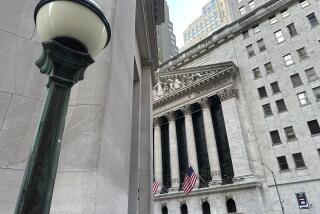Bond Yields Jump Further
- Share via
Long-term Treasury bond yields rose to seven-month highs Wednesday, continuing their recent sharp ascent, amid inflation concerns and fears that the European and Japanese central banks soon will join the Federal Reserve in tightening credit.
Rising bond yields are almost certain to drive mortgage rates up as well. The U.S. average rate for 30-year conventional mortgages hit 6.1% last week, the highest since July 2004.
For bond mutual fund investors, the upturn in interest rates is depressing fund share prices by devaluing older fixed-rate bonds. Some popular funds now are up 1% or less year to date in terms of total return, meaning interest earnings minus change in principal value.
The 10-year Treasury note yield, a benchmark for other long-term rates, jumped to 4.59% from 4.53% on Tuesday. It was the highest closing rate for the T-note since late March, when it reached 4.64%.
The bond market has been volatile lately in part because of technical trading. As mortgage rates rise, for example, investors in mortgage-backed bonds often sell Treasury bonds as part of a portfolio hedging strategy.
But two main forces have been pushing U.S. interest rates up over the last eight weeks, analysts say. One is concern that inflation pressures are building in the economy because of high energy prices. That has driven up longer-term rates because inflation poses the biggest threat to fixed-rate bonds by eroding their returns over time.
The other force pushing rates higher is the expectation that the Fed will continue to tighten credit to damp inflation. Fed policymakers meet on Tuesday and are expected to raise their benchmark short-term rate from 3.75% to 4%, the 12th such increase since mid-2004.
“The economy has shown sufficient resilience that the perception has changed from, ‘The Fed should stop sometime soon,’ to, ‘We’re not sure when the Fed is going to stop,’ ” said Kevin Barry, who oversees $6 billion in bonds at Credit Suisse Asset Management in New York.
What’s more, President Bush’s nomination Monday of Ben S. Bernanke to succeed Alan Greenspan as Fed chairman has raised questions about how Bernanke might shift Fed policy if he is confirmed by the Senate.
The Fed’s key rate has a direct effect on other shorter-term rates in the bond market. The two-year T-note yield rose to a four-year high of 4.36% on Wednesday from 4.33% on Tuesday. It was 3.73% on Sept. 1.
Bond yields also have jumped since early September in Japan and Europe. Surprising strength in the Japanese economy is raising expectations that the Bank of Japan may begin tightening credit next year.
In Europe, Axel Weber, a member of the European Central Bank’s governing council, said Tuesday that the central bank was on high alert for inflation dangers. That added to perceptions the bank might take preemptive measures to head off inflation pressures, most likely by raising its key short-term rate, which has held steady at 2% for more than two years.
“We’ve got the prospect we could have the [major] central banks have correlated tightenings at the end of the first quarter next year,” said Jason Evans, a bond trader at Deutsche Bank Securities in New York.
More to Read
Inside the business of entertainment
The Wide Shot brings you news, analysis and insights on everything from streaming wars to production — and what it all means for the future.
You may occasionally receive promotional content from the Los Angeles Times.










